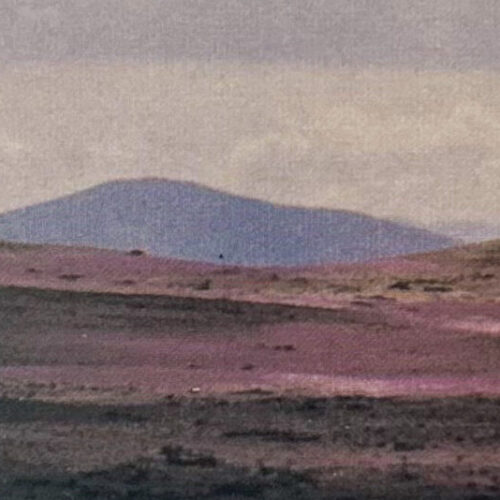Third grade. R. For years, he was just a boy on my bus, a boy other boys teased, a whiny boy. R—who lived less than a mile from my house, on a farm—was a boy I avoided.
Then one afternoon, my mother offered to give him a ride home from school. Some after-school event had disrupted our routine: boy scouts, cub scouts, science day. He buckled himself in the front seat of our cranberry Caravan and talked politely with my mother. She, barely checking on me in the backseat, laughed at his jokes and treated him like the funniest, smartest boy in the world. On the drive home, my mother offered to stop at Polar Cub. While eating a chocolate ice cream cone, I unguarded myself against R’s friendship. Suddenly he didn’t seem so whiny; he seemed adult.
To be clear: I was no best friend “catch” myself. At eight, I had made a comfortable home of my shyness. My social circle consisted of my older brother, two sets of cousins who lived an hour away, and a coterie of circumstantial class friends I seldom saw after we switched teachers. One summer, my parents signed me up for a weeklong day camp. I made no friends that week and dreaded going; walking on the dirt path between activities, two boys kept looking back at me with contempt. They asked why I walked and talked the way I did. They asked if I was a girl. I see now how queerness coiled within my every instinct, a ready spring.
Before we gave R a ride home, all I knew about him was that people made fun of him, my brother included. On the bus, I often heard R defend himself with an ineffectual “shut up.” Ineffectual because he emphasized the “shut,” so that the utterance lost all its force. To his aggressors, his way of saying “shut up” became yet another point of ridicule.
Things changed when we became friends.
*
R was my first best friend in that way only the very young can be friends; we shared a two-seater on the bus, and on that two-seater we shared our inner worlds. We took turns getting off at each other’s stops. At my house, we played video games, and my parents left us to our devices. His mother—a large, imposing woman, louder than his father—required that we do chores before we could play at his house.
R’s small farm was made up of a two-level barn and a big field with a dozen or so cows. Sometimes they rented a bull, which they gated off in a separate area. In the lower level of the barn, they kept farm equipment and, in another room, the chickens, though I can’t say how many. The chicken coop was a place I feared deeply. The musty air in that tiny claustrophobic room, the floor of wet mud that seeped into my shoes and rode up onto our shins, the way R didn’t flinch as he reached into the wood cubbies and scooped up the hens’ white eggs.
The area I preferred was the barn’s top level because that’s where R’s father kept his well-manicured haystacks. I loved the compact, quadrangular hardness of the hay bales, climbing up onto the stacks, and pretending we were in the video games we played at my house. R’s farm cats were not fixed and often had kittens, so we named them frivolously after TV characters and coddled them in straw.
This was the 90s: the Pokemon and Tamagotchi era, the Beanie Babies era, the era of the Spice Girls, which quickly became my favorite band, which then quickly became R’s favorite band. With help from my aunt, whose closet full of high heel shoes I adored, I collected the Chupa Chups stickers and deemed myself Posh. R fancied himself Ginger. We held our own private concerts in the haystacks—private because we knew, or at least I suspected, there was something condemning about our lip-syncs, perhaps something off about our friendship itself.
*
How can I name what subtly shifted? R was getting very attached. For the first time, I started to feel ambivalent about a friendship that was so close it closed in on me. Just before the start of fourth grade, where R hoped we would share the same teacher, my family spent our customary August week at the shore. R’s family rented a place in a neighboring town. One day when we drove to their house, R and I learned our teacher assignments: we were placed in different classes.
R cried and shut himself up in his temporary bedroom. I called to him through the door, said it would be okay, we would see each other every day on the bus. I tried to open the door, but it wouldn’t budge, even though the brass doorknob didn’t have a lock. He sat against the bed and blocked the door with the full force of his legs.
Things did stay much the same in fourth grade, until they didn’t. In an old cabinet in R’s barn, we discovered a stack of magazines. Naked women splayed out across the covers. We rooted around the cabinet and emptied the shelves. Taking one magazine and carefully replacing the others, we brought our contraband to the haystack and gazed. The pages smelled like cigars.
R got a pair of scissors and began snipping out the pictures he liked best. Every picture he cut out included a man. While I was curious about both the men and the women, I found myself judging him. These scraps of paper, several of them literally just cut-out penises, he stashed away in a drawer in the cabinet. One day not long after, to our horror, the magazines were gone.
*
Children live by instinct. They do not have words for things like homophobia or transphobia or toxic masculinity. Back then, could language have helped me and R? Somehow, I can’t quite fathom it. How would a conceptual framework have made a difference? Naming the toxins in the air would not have prevented us from breathing; having more words about cruelty would not have prevented us from experiencing it.
Maybe that’s just a line I tell myself—a way of letting myself off the hook.
Around the time the magazines disappeared, my extroverted brother whittled his core friend group down, and a single best friend emerged: Derek. He was a tidy boy, shy like me but possessed with a gentle magnetism that made him cool. He beat me in all the video games where R had always lost. I began to spend more time at home with Derek and my brother, less time with R. I sensed my mother, father, and brother all supported this move, as they’d constantly teased me about the intensity of our friendship. I had defended R as best I could, but the words that came out of my mouth were powerless, ineffectual. Against the weight of my family’s opinion, everything I said sounded like R’s “shut up.”
When R slept over, mornings began to feel awkward. We had a trampoline at my house, and one day we woke up and went outside to jump. R was wearing just his boxers. I felt weird about it. I looked at the flowy fabric, white with little Tiggers printed all over it. In mid-bounce, I glanced into the darkness of the yawning flap. I didn’t see anything. But I had looked. I quickly climbed down and went back into the house, suggesting we play games instead. Even then, at some level, I recognized that I wasn’t judging R and never had been. I was judging myself.
Soon after the Tigger incident, R came up in conversation between my brother and Derek “R? He’s so gay,” Derek said, and I immediately thought that the word described me: me at the day camp, me in high heels, me in the van with my mother, admiring my pushed-back cuticles from the manicure my aunt gave me. I understood that I was approaching a crisis. Our friendship endangered me, endangered us both.
*
R was injured at my house.
For my ninth birthday that year, I asked my parents if I could host a wrestling match, a new obsession I had fostered with Derek and my brother, attempting to dive into things I perceived as masculine. My parents said no, but I could have a sleepover, parameters that were easy to work around. Early in the morning, I went out to the trampoline with R and two other boys and held a royal rumble: whoever touched the ground was out.
We fumbled around unsupervised on the springy trampoline. The match didn’t last long. R, an easy out, dangled on the trampoline’s edge, gripping the curved metal bar with his full body. Then, swiftly, one of my friends knocked him off with a horse’s kick. R fell downward shoulder-first. I heard my friend crying, a deep, guttural, almost feline growl I can still hear today. Inside, I felt my heart rip open.
R broke his collarbone. A few days later, I visited him at his house, entering his mother’s darkened bedroom where they set him up. In all my time at his house, I’d hardly ever ventured into that room. He was groggy. He sat up and smiled at me from underneath his mother’s white bedspread. He asked if I would sign his sling.
I wonder if they ever think about us, the blameless bystanders of our own circuitous journeys. Those times we endangered them—and here I am not talking about physical harm, but the risk of two souls coming together—did they know how deeply we also wounded ourselves?
*
Instinct was the first day of fifth grade, the first day in a newly constructed elementary school in our township. The building was so clean I didn’t even mind being back in school. I didn’t even think about what I decided to do. At recess, I stood on the sidelines of a soccer game with a friend: the friend who delivered the collarbone push, a kindergarten friend I’d spent more time with before I met R, someone, truth be told, who understood me far less.
When R walked up to us, up to me, he was innocent, enthusiastic, his first day in that new school too. I didn’t know what was left to say. I stared at the soccer field and watched the boys race each other for a chance to kick the ball. I left my body. I became the air, everywhere and nowhere at once.

Daniel Kessel
Daniel Kessel is a writer and editor living in Philadelphia. He is currently pursuing an MFA at Rutgers University-Camden.



